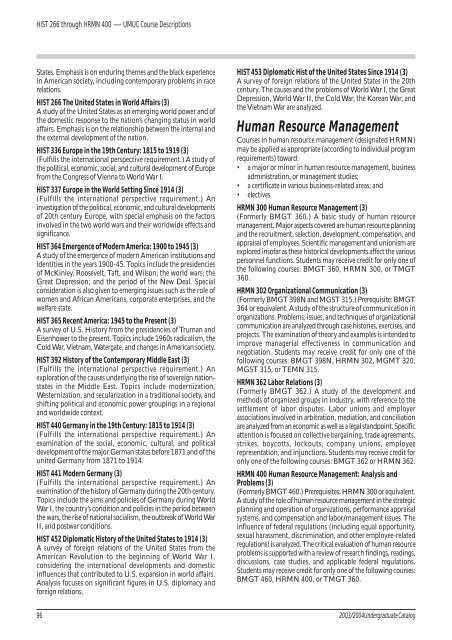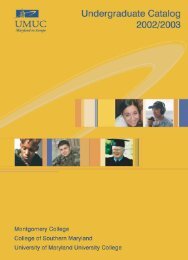Undergraduate - UMUC Europe
Undergraduate - UMUC Europe
Undergraduate - UMUC Europe
You also want an ePaper? Increase the reach of your titles
YUMPU automatically turns print PDFs into web optimized ePapers that Google loves.
HIST 266 through HRMN 400 — <strong>UMUC</strong> Course Descriptions<br />
States. Emphasis is on enduring themes and the black experience<br />
in American society, including contemporary problems in race<br />
relations.<br />
HIST 266 The United States in World Affairs (3)<br />
A study of the United States as an emerging world power and of<br />
the domestic response to the nation’s changing status in world<br />
affairs. Emphasis is on the relationship between the internal and<br />
the external development of the nation.<br />
HIST 336 <strong>Europe</strong> in the 19th Century: 1815 to 1919 (3)<br />
(Fulfills the international perspective requirement.) A study of<br />
the political, economic, social, and cultural development of <strong>Europe</strong><br />
from the Congress of Vienna to World War I.<br />
HIST 337 <strong>Europe</strong> in the World Setting Since 1914 (3)<br />
(Fulfills the international perspective requirement.) An<br />
investigation of the political, economic, and cultural developments<br />
of 20th century <strong>Europe</strong>, with special emphasis on the factors<br />
involved in the two world wars and their worldwide effects and<br />
significance.<br />
HIST 364 Emergence of Modern America: 1900 to 1945 (3)<br />
A study of the emergence of modern American institutions and<br />
identities in the years 1900-45. Topics include the presidencies<br />
of McKinley, Roosevelt, Taft, and Wilson; the world wars; the<br />
Great Depression; and the period of the New Deal. Special<br />
consideration is also given to emerging issues such as the role of<br />
women and African Americans, corporate enterprises, and the<br />
welfare state.<br />
HIST 365 Recent America: 1945 to the Present (3)<br />
A survey of U.S. History from the presidencies of Truman and<br />
Eisenhower to the present. Topics include 1960s radicalism, the<br />
Cold War, Vietnam, Watergate, and changes in American society.<br />
HIST 392 History of the Contemporary Middle East (3)<br />
(Fulfills the international perspective requirement.) An<br />
exploration of the causes underlying the rise of sovereign nationstates<br />
in the Middle East. Topics include modernization,<br />
Westernization, and secularization in a traditional society, and<br />
shifting political and economic power groupings in a regional<br />
and worldwide context.<br />
HIST 440 Germany in the 19th Century: 1815 to 1914 (3)<br />
(Fulfills the international perspective requirement.) An<br />
examination of the social, economic, cultural, and political<br />
development of the major German states before 1871 and of the<br />
united Germany from 1871 to 1914.<br />
HIST 441 Modern Germany (3)<br />
(Fulfills the international perspective requirement.) An<br />
examination of the history of Germany during the 20th century.<br />
Topics include the aims and policies of Germany during World<br />
War I, the country’s condition and policies in the period between<br />
the wars, the rise of national socialism, the outbreak of World War<br />
II, and postwar conditions.<br />
HIST 452 Diplomatic History of the United States to 1914 (3)<br />
A survey of foreign relations of the United States from the<br />
American Revolution to the beginning of World War I,<br />
considering the international developments and domestic<br />
influences that contributed to U.S. expansion in world affairs.<br />
Analysis focuses on significant figures in U.S. diplomacy and<br />
foreign relations.<br />
96<br />
HIST 453 Diplomatic Hist of the United States Since 1914 (3)<br />
A survey of foreign relations of the United States in the 20th<br />
century. The causes and the problems of World War I, the Great<br />
Depression, World War II, the Cold War, the Korean War, and<br />
the Vietnam War are analyzed.<br />
Human Resource Management<br />
Courses in human resource management (designated HRMN)<br />
may be applied as appropriate (according to individual program<br />
requirements) toward:<br />
a major or minor in human resource management, business<br />
administration, or management studies;<br />
a certificate in various business-related areas; and<br />
electives.<br />
HRMN 300 Human Resource Management (3)<br />
(Formerly BMGT 360.) A basic study of human resource<br />
management. Major aspects covered are human resource planning<br />
and the recruitment, selection, development, compensation, and<br />
appraisal of employees. Scientific management and unionism are<br />
explored insofar as these historical developments affect the various<br />
personnel functions. Students may receive credit for only one of<br />
the following courses: BMGT 360, HRMN 300, or TMGT<br />
360.<br />
HRMN 302 Organizational Communication (3)<br />
(Formerly BMGT 398N and MGST 315.) Prerequisite: BMGT<br />
364 or equivalent. A study of the structure of communication in<br />
organizations. Problems, issues, and techniques of organizational<br />
communication are analyzed through case histories, exercises, and<br />
projects. The examination of theory and examples is intended to<br />
improve managerial effectiveness in communication and<br />
negotiation. Students may receive credit for only one of the<br />
following courses: BMGT 398N, HRMN 302, MGMT 320,<br />
MGST 315, or TEMN 315.<br />
HRMN 362 Labor Relations (3)<br />
(Formerly BMGT 362.) A study of the development and<br />
methods of organized groups in industry, with reference to the<br />
settlement of labor disputes. Labor unions and employer<br />
associations involved in arbitration, mediation, and conciliation<br />
are analyzed from an economic as well as a legal standpoint. Specific<br />
attention is focused on collective bargaining, trade agreements,<br />
strikes, boycotts, lockouts, company unions, employee<br />
representation, and injunctions. Students may receive credit for<br />
only one of the following courses: BMGT 362 or HRMN 362.<br />
HRMN 400 Human Resource Management: Analysis and<br />
Problems (3)<br />
(Formerly BMGT 460.) Prerequisites: HRMN 300 or equivalent.<br />
A study of the role of human resource management in the strategic<br />
planning and operation of organizations, performance appraisal<br />
systems, and compensation and labor/management issues. The<br />
influence of federal regulations (including equal opportunity,<br />
sexual harassment, discrimination, and other employee-related<br />
regulations) is analyzed. The critical evaluation of human resource<br />
problems is supported with a review of research findings, readings,<br />
discussions, case studies, and applicable federal regulations.<br />
Students may receive credit for only one of the following courses:<br />
BMGT 460, HRMN 400, or TMGT 360.<br />
2003/2004<strong>Undergraduate</strong> Catalog






